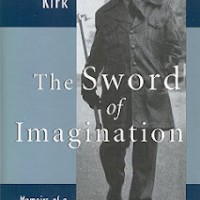Russell Kirk and the Swords of Imagination, by Darrin Moore
The battle for our future is being fought within the imaginations of men. This has always been so. Russell Kirk explained: “All great systems, ethical or political, attain their ascendency over the minds of men by virtue of their appeal to the imagination; and when they cease to touch the chords of wonder and mystery and hope, their power is lost, and men look elsewhere for some set of principles by which they may be guided.” Today, with atheistic secular humanitarianism large and in charge, many fear that we may fall prey to immoral forces; avarice, envy and tyranny.
Being encoded by our Creator with free will, human beings have the capacity for both great good and horrendous evil. Man can rise to the level just below angels or sink to the depths just above the animals. Whether he slides into degraded savagery or soars with elegant eagles depends on his reasoning and his will–and these are shaped by his imagination. The ‘moral imagination’ is, in Kirk’s phrase, “a man’s power to perceive ethical truth, abiding law in the seeming chaos of many events. Without the moral imagination, man would live merely from day to day, or rather from moment to moment, as dogs do. It is a strange faculty—inexplicable if men are assumed to have an animal nature only—of discerning greatness, justice, and order, beyond the bars of appetite and self-interest.” Chuck Colson added, “The moral imagination is more than rational, it is poetic, stirring long-atrophied faculties for nobility, compassion and virtue. . . It begins with awe, reverence and appreciation for order within creation. It sees the value of tradition, revelation, family, and community, and responds with duty, commitment and dedication.”
Competing with the moral imagination are three deviant imaginations. The first is the idyllic imagination which believes that man can emancipate himself from all duty, honor, decorum, and standards and simply escape into an endless stream of exciting sensation and sensuality. The idyllic imagination is utopian and materialistic. It falsely believes that if we could simply construct the correct set of laws, it wouldn’t matter whether men were good or bad.
Vigen Guroian adds a closely related second; the idolatrous imagination, which turns vanity into virtue and fixates on famous false heroes from sports, music, movie and television who’re often prepackaged and piped into our culture by mass marketing. Rather than innocently enjoying these entertainments in their proper perspective, obsessions with ‘the cult of the colossal’ crowd out not only worthy heroes, but also lost is valuable leisure time in which an individual’s genuine and optimal personality can be cultivated.
Once an individual becomes bored or disillusioned with the idyllic and idolatrous imaginations, the diabolical imagination often takes hold. Its works can be seen on prime time television pandering “to the lust for violence, destruction, cruelty, and sensational disorder.”
Edmund Burke first mentioned ‘the moral imagination’ in a passage that is apropos: “All the decent drapery of life is to be rudely torn off. All the superadded ideas, furnished from the wardrobe of a moral imagination, which the heart owns, and the understanding ratifies, as necessary to cover the defects of our naked shivering nature, and to raise it to dignity in our own estimation, are to be exploded as a ridiculous, absurd, and antiquated fashion.”
Read the complete article in The Imaginative Conservative
